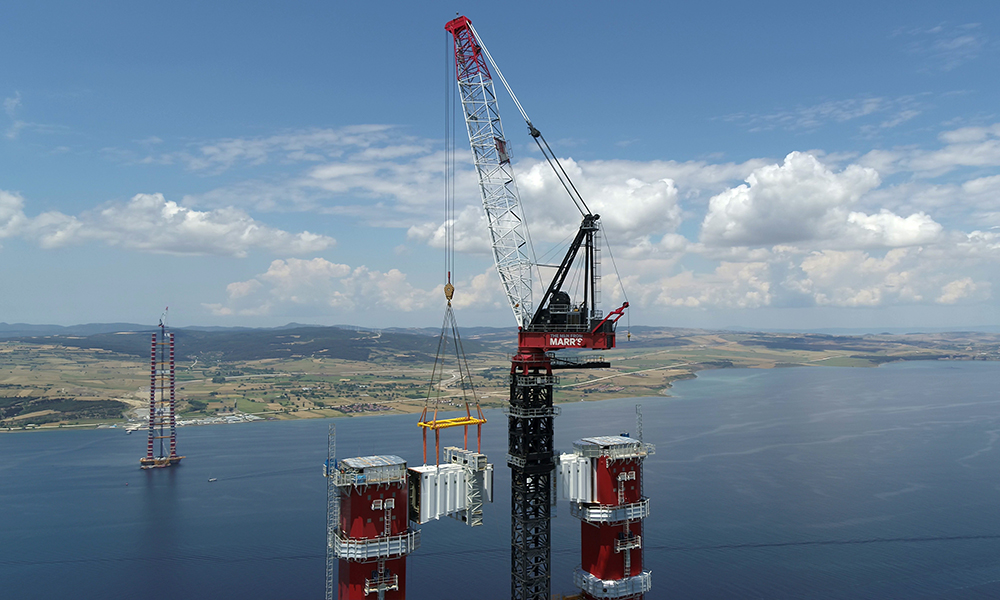Marr Contracting, an Australian-based heavy lifting tower crane specialist, has announced that it has completed a world-record lift during the construction of the 1915 Çanakkale Bridge in Turkey.
In a statement, Marr said that the record-breaking construction feat saw one of Marr’s M2480D Heavy Lift Luffers (HLL) ¬– which with a lifting capacity of 330 tonnes is the world’s largest capacity tower crane – undertake the world’s heaviest (155 tonnes) at height (318 metres) craneage lift on what will be the world’s longest span suspension bridge.
With the M2480D crane perched 328 metres above the water, it took approximately 30 minutes to lift a 155-tonne piece of the upper cross beam (UCB) to its position 318 metres above sea level, the statement said. The installation of the centre section of the UCB on the Asian side of the Çanakkale Strait, completed a major milestone in the construction of the bridge, with the lift taking place at midnight on Sunday 7 June 2020.
The European side was completed 24 hours later, with the final centrepieces installed on both sides of the Bridge at a final height of 318 metres on Monday 8 June 2020.
DLSY (Daelim – Limak – SK E&C – Yapi Merkezi) joint venture awarded the craneage contract to Marr Contracting International in 2017 after a competitive tender process including some of the world’s leading craneage companies, the statement added.
Impressed by Marr’s track record in designing and delivering innovative lifting solutions on similarly challenging large-scale projects in Australia and around the world, DLSY Joint Venture challenged the Marr team to develop a strategy that would decrease construction time and associated risk.
The Marr team worked with the DLSY project team to develop a craneage methodology that makes use of the M2480D HLL crane’s capacity to lift heavier modularised components instead of the more traditional approach of lifting smaller components one-by-one and then welding on-site.
Two of Marr’s M2480D cranes have been on-site since last year constructing the bridge’s 318-metre high towers, and through fewer lifts of larger pieces the craneage solution has reduced the construction schedule, with less site-based activities and a higher level of on-site safety.
According to the deputy project manager, Alper Alemdaroglu, the DLSY joint venture wanted a heavy lifting partner who could think outside-the-box to make their vision for how they wanted to build the Bridge a reality.
“The Men From Marr’s have a reputation for technical competence and innovative thinking in developing strategies for heavy lifting on projects of this scale, but what has impressed us most is their collaborative approach to finding a solution that suited our construction methodology and programme, and then delivering it,” said Mr Alemdaroglu.
Highlighting that a strong working relationship and alignment between Marr and the joint venture partners has been key to the project’s success to date, Marr Contracting managing director, Simon Marr, said.
“DLSY knew what they wanted, and they were also open to a non-traditional heavy lifting solution. As experts in construction, the joint venture partners respected our expertise in heavy lifting and together we have been able to construct the tower stage of the project in record time”.
“The unparalleled lifting capacity of our M2480D HLL cranes have been a game changer for this project and will potentially change the way our industry looks at how bridges can be built, as well as a host of other large-scale projects. We are using the same way of thinking to challenge methodology on the construction of other projects including metro train stations, data centres, large commercial construction, energy construction and working refineries,” Mr Marr explained.
The record-breaking lift is one of a number of engineering feats completed by Marr Contracting on the construction of this nation-building project. In November 2019, after being fully assembled at a dry dock, two of Marr’s M2480D HLL cranes were lifted as complete units, each weighing 600 tonnes, by a floating crane and transported a kilometre to the bridge tower caisson in the middle of the Dardanelles (Çanakkale Strait), where they were successfully installed in a one day operation.
CEO of the joint-stock company established by the Turkish-Korean consortium, ÇOK A.Ş., Mr Mustafa Tanriverdi, said: “The four joint venture partner companies (Limak and Yapı Merkezi from Turkey, Daelim and SK E&C from South Korea) are contributing to the project by allocating their particular technical expertise acquired from working on diverse projects across the world to all phases of the project.
“With such strong historical links between Turkey and Australia, we are delighted to have an Australian team contributing their expertise and innovative thinking to this important nation-building project.”
